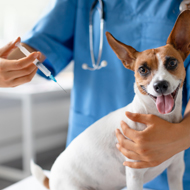Future of the veterinary profession debated
BVA president Robin Hargreaves
THE BVA has hosted a discussion forum on what may be in store for veterinary graduates in the years to come, in response to concerns raised by its members.
Entitled "What lies ahead for recent and future veterinary graduates?", the event was held in London on October 23, to enable members and guests to hear presentations and take part in question and answer sessions.
Described as an "intelligence gathering exercise" by BVA president and chair Robin Hargreaves, speakers presented their studies and observations on topics as diverse as EMS provision, quality of teaching in vet schools and trends in numbers of veterinary graduates, along with anecdotal accounts of how this increase may negatively impact the profession.
The RCVS' Survey of Recent Graduates, 2013 was launched the previous day, and the results were presented and discussed. Priya Sharp, of the BVA Members' Services Group (MSG), talked through some of the trends. During the past 10 years the number of veterinary graduates has increased from 499 to 805, sparking fears of unemployment issues.
The report showed the length of time taken for graduates to find their first job had increased from 2008 to 2012, with more students finding that it took three to six attempts to find work, instead of taking one to three attempts.
Prof Reid revealed 40 of the veterinary colleges from the EEA were not approved, and that graduates from these institutions were being (inadvertently) employed in UK practices
Graduates taking on voluntary positions had increased in 2012 to six per cent, but the report stated: "The results… suggest that there has been a slight, albeit variable, increase in the proportion of respondents since 2008 whose first position within the veterinary sector was unpaid. The overwhelming majority of respondents, however, are still managing to acquire paid veterinary work after graduating from university."
Summing up her presentation, Mrs Sharp said: "This survey implies there is enough veterinary work (at the moment), but compromises must be made."
The BVA's Rachael Kilroy presented views received from MSG, of which she is chair. "There is concern in the profession and from members on employment prospects, EMS and teaching staff. How will vet schools prepare their grads for work? More new graduates will present challenges to the profession, that is undeniable," she said.
RVC principal Stuart Reid.
Anecdotal reports and comments were one thing, said RVC principal, Stuart Reid, but the profession must be careful to back up comments with evidence. Prof Reid presented an international perspective on trends in the veterinary field, saying that in the US salaries had increased, but so had student debt. The US profession had undergone "reinvention" as footfall in practices was decreasing and new ways of working had to be instigated to compensate.
When discussing the situation in Europe, Prof Reid revealed 40 of the veterinary colleges from the European Economic Area were not approved, and that graduates from these institutions were being (inadvertently) employed in UK practices.
A voluntary scheme of accreditation for vet schools exists in Europe, the European Association of Establishments for Veterinary Education (EAEVE), but many schools have never even been visited and have no accreditation under this scheme – however, this doesn't necessarily mean a school has failed its national approval process.
Under EU regulations, the RCVS has to automatically accept EU nationals or community-rights-entitled people from an EU member state who hold a recognised EU veterinary qualification on to the register. Graduates from those other countries would have to take the RCVS' statutory membership exam.
Prof Reid said: "We may not be able to control the numbers of graduates coming out of Europe, so we have to think in other ways about what direction the profession goes in and the jobs that veterinary graduates can take."
Freda Andrews, RCVS' director of education, confirmed the college's obligations on registering vet graduates. She explained that the number of new registrants had increased, and the number of those from overseas had also increased.
Mrs Andrews presented figures on the estimated number of EMS "weeks" available, calculated from the list of practices registered as supporting EMS, and this came out as being only around 50 per cent of potential capacity. She said: "No university graduates have been significantly short on their EMS so far, despite the growing numbers of vet students."
Mrs Andrews confirmed that the college had no mandate to control student or graduate numbers, but discussed the number of new registrants on the MRCVS register, saying that if numbers continued as they were, there "would be a shortfall of 422 vets per year" ongoing.
During his summing up, Mr Hargreaves addressed the issues of increasing numbers of graduates and the situation in Europe with unapproved vet schools, saying "the BVA was on to it".
Speaking to MRCVSonline after the meeting, Mr Hargreaves said: "BVA is exploring how significant the proportion is of veterinary graduates coming out of these schools who are entitled to work in the EU. We will look into what, if anything, we could do to ensure these schools meet the required standards, which may include lobbying the UK to make representations at a European level of those countries where the non-approved schools operate.
"BVA can’t advise practices on who or who not to recruit but we may look into these issues and may make available guidance in an accessible format for members to understand what different veterinary accreditations mean. Another element that came to light at the discussion forum is the fact that some overseas universities don’t have a compulsory EMS requirement and these are all things that employers may want to take into consideration when assessing candidates’ suitability for a position."



 RUMA CA&E has extended the deadline for its online survey into vaccine availability.
RUMA CA&E has extended the deadline for its online survey into vaccine availability.